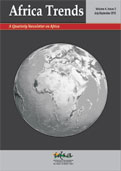Modi’s China Visit – Allaying Maritime Misgivings
For better operational cooperation, India and China need to go beyond rudimentary agreements on combating piracy and crime in the Western Indian Ocean. They need to work out an acceptable framework for functional collaboration and create positive momentum in favour of greater strategic interaction.
- Abhijit Singh |
- May 11, 2015 |












